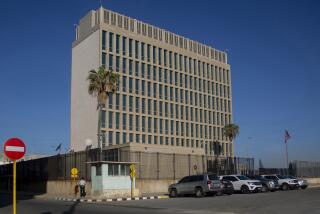Vaccines, Gulf War Syndrome Link Studied
- Share via
WASHINGTON — A new study by British researchers suggests that there may be a link between the mysterious Gulf War syndrome that plagued tens of thousands of veterans and the practice of giving troops multiple vaccinations before combat.
The study, to be published today in the British Medical Journal, finds “a specific relation between multiple vaccination and later poor health” among veterans of the 1990-91 conflict between a U.S.-led coalition and Iraq.
While the vaccines themselves do not seem to be harmful, the study says, when combined with the stress of deployment, “they may be associated with adverse health outcomes.”
The researchers acknowledged that more study is needed but said that their findings could be used by opponents of the Pentagon’s controversial program of giving anthrax vaccines to U.S. troops who are headed abroad.
Medical researchers have been looking for the cause of the syndrome since veterans returned home from the Persian Gulf and began complaining of fatigue, rashes, insomnia, digestive problems, poor concentration, nausea, joint pains and other symptoms.
The new study, conducted by six researchers at King’s College, London, used a questionnaire to examine the medical histories of 3,284 of the 53,462 troops from the United Kingdom who served in the Gulf War. It focused particularly on 928 troops who had records establishing that they had received some of the nine vaccines administered to United Kingdom troops, including those for anthrax, plague, tetanus, cholera and hepatitis A and B.
The researchers found that those who had received the vaccines in combination had a higher likelihood of health problems, such as post-traumatic stress reaction, fatigue, psychological distress and poor physical functioning. The results indicate that troops who received multiple vaccinations during deployment had a higher risk of later health problems. Those who were given them earlier did not.
The study said that it would be “folly” to send troops into battle without the kind of protection that these vaccines afford. But it said that it would be “prudent” to do as much as possible to make sure soldiers stay current on their vaccines at all times so they do not need to receive them in a heavy concentration before a deployment.
A spokesman for the U.S. Defense Department, Jim Turner, said he was unaware of the study. But he said that the Pentagon has been administering multiple vaccinations for many years and sees no reason to suspect the practice is unsafe.
The Presidential Advisory Commission on Veterans’ Gulf War Illnesses, organized in 1995, assessed possible causes of the syndrome and considered the possibility that multiple vaccinations might have played a role.
Dr. Arthur Caplan, one member of the group, said the commission concluded that “it might be one contributing factor” and urged more research.
Caplan, who is a bioethicist at the University of Pennsylvania, recalled that U.S. troops sent to the Persian Gulf often received a half-dozen vaccines and booster shots in a short period of time.
Military doctors administered injections of anthrax vaccine because of fears that Iraqi President Saddam Hussein might use germ weapons, which he was known to have stockpiled.
Caplan noted that the health risks of multiple vaccinations of children has recently been a topic of discussion among pediatricians.
And he speculated that the British group’s finding might be viewed by opponents of the anthrax vaccine program as another “yellow light” suggesting that the Pentagon should use caution in requiring troops to receive the shots.
The British study cautioned that other factors could play a role in its results. “Vaccines are only one of many exposures indicated,” it said. It found no reason to believe that pesticides, which were used to ward off desert insects, had interacted with the vaccines to hurt the troops’ health.







